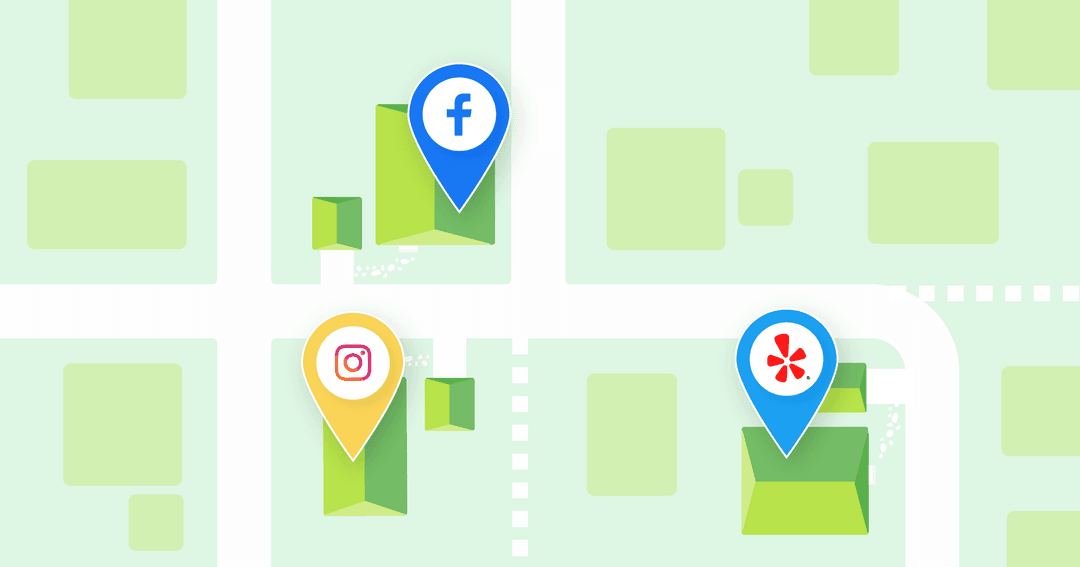Table of Contents
QUICK SUMMARY:
Real estate marketing ideas are essential to enhance brand visibility and generate qualified leads. This article shares effective real estate marketing tactics, content ideas, and best practices. Explore actionable strategies that all real estate professionals should know, along with tips to automate reporting and data tracking.
Whether purchasing a family home, income-generating rental, or a vacation cottage, buying or selling a property involves extensive research. Before deciding on any solid action–like signing a representation agreement or attending open houses–prospective clients are doing their due diligence.
They’re comparing real estate websites, turning to social media platforms, and asking around to family and friends… all to gauge whether a real estate brokerage has the expertise they need.
So, what does this all mean for a real estate brokerage, property management firm, or a marketing agency managing one? Rather than a roadblock, it’s an opportunity to stand out.
That’s where a solid real estate marketing strategy comes in. It’s a way to reach your target audience, create a wave in the local community, and (of course) attract real estate leads.
If you’re not sure where to begin, don't worry–you’re in the right place! This article explores the top marketing ideas for real estate businesses, along with tips for creating top-notch content.
7 Real Estate Marketing Tactics (and Many, Many More Ideas)
Whether you work in the marketing department of a real estate brokerage or property management firm, or you work at a marketing agency focused on clients within the real estate niche, there are plenty of tactics to leverage when drumming up new real estate marketing ideas.
Let’s take a look at the top seven tactics, along with specific real estate marketing ideas pertaining to each one.
1. Focus on a Real Estate Niche
Imagine you’re a seasoned investor. You’re eyeing a pre-construction penthouse in an upscale development and need to flip your last investment… ASAP. The clock is ticking. You absolutely need liquid capital and don’t want to miss out on a steal of a deal.
With so much on the line, who would you pick–a general realtor or one with a track record of selling luxury properties? More than likely, it’s the latter.
That’s the power of niche specialization. It’s a way to understand the needs of a specific type of client and create a real estate business that stands out. While it may seem limiting–no one wants to turn away business, after all–it’s an opportunity to appeal to a well-defined target audience.
When the time comes to buy or sell a specific type of property, marketing will be top of mind, which may lead to more business through the door and even word-of-mouth referrals. It also becomes easier to identify niche-specific goals, create an effective marketing strategy, and achieve results.
Our clients are in the same niche (real estate investors). This allows us to really understand our clients, what successful marketing campaigns look like, and which metrics are most important to them. We report on the basic KPIs and take it one step further by reporting on qualified leads, offers made, and deals closed.
Jacob Hicks, Owner, Magnyfi
If you’re wondering what real estate niches look like, consider the following categories for inspiration.
Type | Description |
|---|---|
Geographic Niche | Focuses on a defined local area, such as a particular school district, municipality, neighborhood, or intersection. |
Demographic Niche | Targets a specific type of client, such as empty nesters, divorcing couples, military families, or newlyweds. Messaging should resonate with their experiences (e.g., a blog on "A Fresh Start: Compassionate Real Estate Services for Divorcing Couples"). |
Home Style Niche | Highlights sought-after architectural styles, such as Craftsman, Brownstone, or Victorian homes. |
Lifestyle Niche | Based on a potential client’s current life stage and preferences. For example, young professionals may be interested in properties close to nightlife, shopping, and public transportation. |
Feature & Function Niches | Emphasizes any unique selling features (e.g., properties that are eco-friendly, walkable, or ideal for hobby farming). |
2. Keep Websites In Tip Top Shape
First impressions are lasting ones–and it doesn’t just apply to in-person interactions.
Often, prospective clients visit a real estate website to scope the market, learn about a specific property, or get guidance (e.g., about the home-buying process). In other words, it’s an opportunity to demonstrate your expertise, answer questions, and even generate qualified leads.
So, the last thing you want is a serious prospect falling through the cracks, all because of an outdated or poorly designed website.
A website is often the first point of contact between a business and its potential customers, which is why we prioritize good design and user experience. Good design is good for business.
Adam Binder, Founder & CEO, Creative Click Media
Consider the following best practices for real estate websites:
Update Property Listings, Blog Posts, and Other Website Collateral Regularly. This may include marking properties as “Sold,” adding updated architectural renders to online brochures, or infusing new SEO keywords.
Add an NAP (Name, Address, and Phone Number) Profile to All Web Pages. This will make it easy for prospective clients to contact you at any point in their browsing journey.
Include Clickable Buttons for Your Social Media Accounts. This is a neat way to build your following and encourage further brand exploration.
Use High-Resolution Media Files, but Ensure They Don’t Lead to Slow Load Times. Use a compressed version or alternative format (e.g., a JPEG file) where possible.
Ensure That All Webpages Are Infused With Local-Specific Structured Data. For example, this may include the city (“Minnesota”) and the property type (“SingleFamilyResidence”). Use Google’s Schema Markup Testing Tool to see what appears on search results.
Bridge the Gap Between the Website and CRM. For example, embed Hubspot forms directly into a “Contact Us” page). This way, leads will go directly into the database, streamlining the follow-up process for real estate agents.
Conduct a Regular Site Audit To Uncover Site-Related Issues, Page Errors, and Changes To Search Engine Rankings. As a best practice, run this exercise once a month.
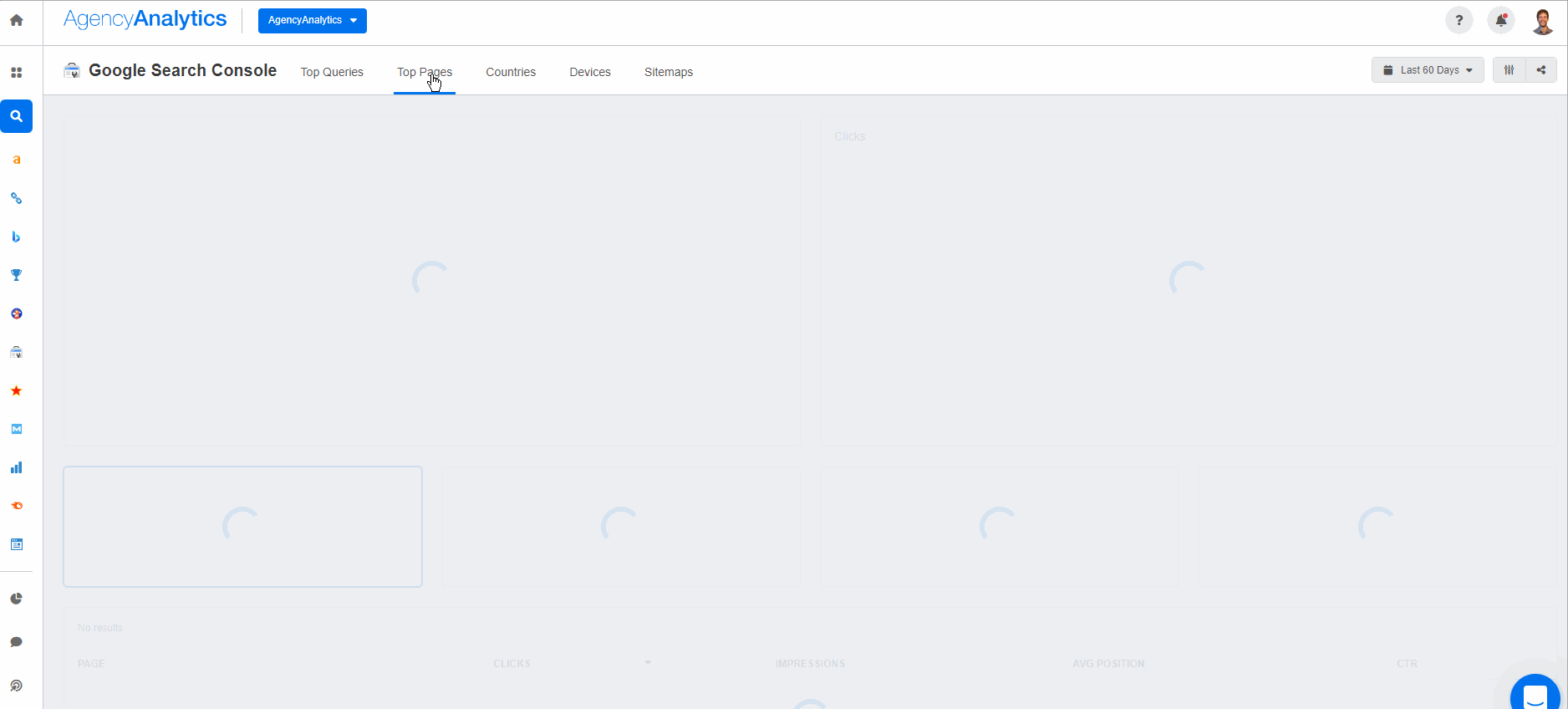
Easily identify SEO errors and conquer the SERPs. Explore the Google Search Console integration in AgencyAnalytics today, free for 14 days.
3. Use Social Proof as Traction
Purchasing or selling real estate is a major life decision. So, it’s understandable that potential clients want reassurance that they’re choosing the right partnership.
Sure–emphasizing the number of properties successfully sold sounds great (and it’s necessary). However, social proof is a powerful real estate marketing tactic that relieves the pressure of hard selling. It’s a way for past clients to share their experiences, vouch for an agent’s credibility, and show that they’re worth investing in.
Reviews are what sell new business. They are vital when customers are making a decision. Without reviews, prospects don't know whether they should trust you. Positive reviews make potential customers feel "warm and fuzzy" about choosing your business out of the pack. Even professional responses to negative reviews can convince a prospect that your company is the one they want to work with.
Anya Curry, Owner, Ambidextrous Services
Reviews are versatile, too–repurpose them on any social media platform, website, MLS listings, and even in an email marketing campaign.
As a best practice, always ask for permission before using testimonials in real estate marketing materials. If clients are uncomfortable using their full name, they might be more open to just a first name or initials.
While sourcing client reviews may seem like a hassle, it’s more than possible with a systematic approach–here are some actionable tips.
Strategy | Description |
|---|---|
Ask For Reviews at Strategic Touchpoints | After successfully closing a deal, ask clients if they would be willing to provide a testimonial. Sooner is better than later, as a positive experience may be fresh in their minds. |
Use Different Formats | While written text is common, video testimonials should be considered to drive engagement. Offer to record the client’s testimonial during a final walk-through or closing. |
Look Within Your Network | Ask industry peers for referrals (e.g., home inspectors, mortgage brokers, and lawyers). This may also be a mutually beneficial opportunity to acquire backlinks, create case studies, and collaborate in the future. |
Create a Repeatable Process | Make it easy for clients to share a testimonial (e.g., share a link to a Google Form). If you’ve got an extensive database, consider setting up an automated email survey through the CRM once a deal is closed. |
Also, remember to monitor online reputation over time. Check social media pages, Google Business Profile, and other relevant platforms. Even join local Facebook groups to keep an ear on the ground!
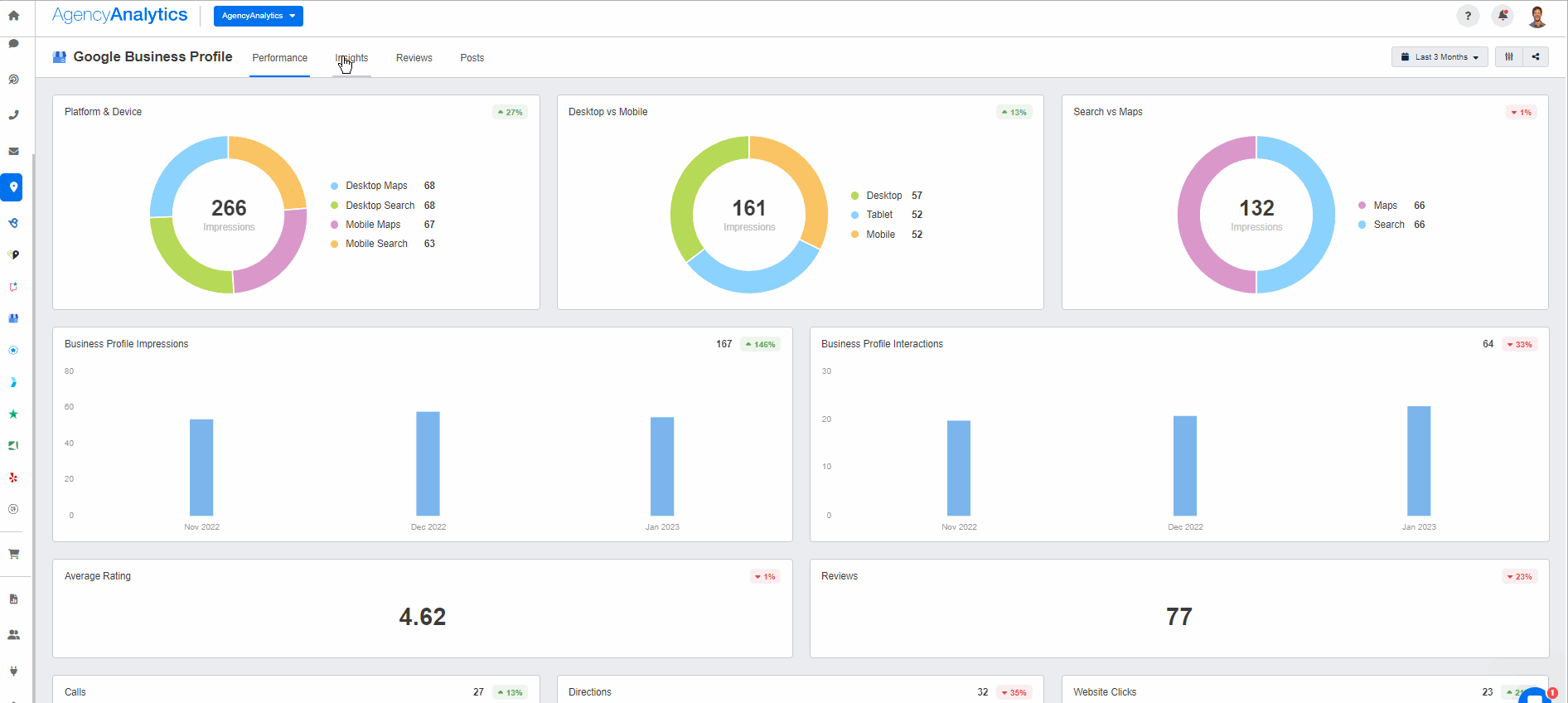
Not in the mood to monitor reviews manually? Keep on the pulse of online reputation with AgencyAnalytics. Access integrations like Yelp, Google Business Profile, and more–try it today, free for 14 days.
4. Leverage the Power of Local SEO
Real estate is all about location, location, location. Did we mention… location?
It makes sense–just think about a first-time home buyer. They may have their eyes set on a neighborhood close to a specific school and grandma's place. Their Google search history may include terms like “detached home Middleton,” “townhouses for sale near Woodbridge Elementary,” or “local real estate agents near me.”
When a prospect uses these terms, realtors want to show up on the SERPs at the exact right time. That’s where the power of a local SEO strategy lies–it’s a way to establish credibility in a geographic area and reach the right target market.
Local SEO humanizes local businesses and brings them closer to their target audience. It represents an opportunity for online visibility and personalized communication. It’s an effective way to generate meaningful connections between businesses and their customers.
Anthony Guilhem, President, Momentumm Digital
More specifically, real estate professionals should:
Create a Google Business Profile. It’s a dynamic way to share a firm’s physical address, contact information, client reviews, and pictures.
Source Credible Backlinks. Think: local directories, a real estate national association, or industry-related websites. This is a way to boost domain authority, improve search engine rankings, and attract local leads.
Use Local Hashtags and Tag Locations. This is key for social media posts (e.g., #homesforsaleWisconsin).
Host Local Events. This will create a buzz in the community (e.g., host free seminars to share your real estate knowledge).
Consider Local Sponsorships. This creates an opportunity to network and boost visibility (e.g., partner with other local businesses to promote a farmer’s market).
Create a Range of Local-Specific Content. Use this space to address the needs of prospective clients. Some ideas include:
Neighborhood eBook guides (e.g., A Complete Guide to Living in Georgetown, Washington D.C).
Property listings with detailed descriptions (e.g., “Stunning 3-Bedroom Home for Sale in Palo Alto, CA” with dimensions, photos, and other relevant information). Aside from your own website, post these listings on popular real estate platforms (e.g., Zillow, Realtor.com).
Local market reports (e.g., “Real Estate Market Trends in Austin, TX for 2024”).
Home buying tips for specific areas (e.g., a blog post on “Top 10 Tips for Buying a Home in Brooklyn, NY).
Infuse Local-Sensitive keywords Into Content. Leverage keywords in all SEO-related areas (e.g., metadata, Alt descriptions). Use automated tools like Ahrefs and Semrush to uncover relevant terms.
There are plenty of clues for Google to see exactly where your service is performed. For example, if you are located in Denver, ensure it is in the metadata and sprinkled throughout the content. Don't go wild with keyword or geo stuffing, though–it ruins the flow of content and doesn't work. Put the location in the title tag, the H1, and the meta description. I also like to add it to the final paragraph with a Call to Action.
Rachel Jackson, Lead SEO Specialist, Wit Digital
5. Create Content Based on the Customer Journey
The best real estate marketing goes beyond property photos. In fact, there are many ripe opportunities to grab attention, demonstrate expertise, and attract new clients.
To get the most from this exercise, map the customer journey. Remember–each prospect is at a different stage. While one is now starting their home search, another is ready to sign the dotted line for real estate agency services.
As a refresher, here’s a breakdown of each stage and a few ideas to get started.
Awareness Stage
At this stage, a prospect decides to buy or sell their property. They’re now starting their research and learning about a real estate brand. To make a solid first impression, consider the following content types.
Content Type | Examples |
|---|---|
Blog Posts | Write about commonly-researched topics (e.g., “Buying vs. Renting a Property”; “How to Choose the Right Neighborhood for Your Family”; How Mortgage Rates Impact Your Home Purchase”). |
Social Media Posts | Share engaging visuals, such as local community highlights and property previews. Also, consider behind-the-scenes footage to make a personal connection (e.g., an Instagram reel on “A Day in the Life of a Real Estate Agent). |
A Real Estate Podcast | Create a podcast to solidify your authority (e.g., tips for first-time home buyers or trends in the real estate industry). |
Consideration Stage
At this point, prospective buyers or sellers are exploring options. They’re researching different real estate firms and agents, looking for the best representation possible.
To reach prospects in this stage, focus on educational content that underscores expertise (like the examples below).
Content Type | Examples |
|---|---|
In-Depth Articles | Provide detailed guides that demonstrate knowledge of the market. This may include guidance on buying or selling properties, financing options, or investment tips. |
Webinars and Workshops | Host online events to discuss market trends, home-buying tips, and investment strategies. |
Ebooks and Guides | Offer downloadable resources that cover relevant parts of the buying or selling process (e.g., “What You Should Know About a Title Search”). |
Property Video Tours | Create catchy property walk-through videos. Focus on key selling features, amenities, and surrounding areas. |
Decision Stage
At the decision stage, potential clients are ready to take action. This may include signing a representation agreement, scheduling a viewing, or filling out a contact form.
Here are some content ideas to consider to boost the visibility of a real estate business during this stage.
Content Type | Description |
|---|---|
Property Listings | Ensure all real estate listings are detailed, with high-quality photos, video tours, virtual simulations (if possible), and floor plans. |
Case Studies and Success Stories | Share stories of successful property transactions and client testimonials. |
Frequently Asked Questions (FAQs) | Address common concerns that potential buyers or sellers might have at this stage (e.g., an Instagram Live video on “What should you expect during the closing process?”). |
Personalized Consultations | Offer free 1:1 consultations to chat with clients who are strongly considering your real estate services. |
Whatever you create, be sure to infuse storytelling and emotive messaging.
For example, say you’re creating a social media campaign geared towards newlywed couples. While a caption like “Buy a house” is technically correct, it isn’t as impactful as something like “Step into your future” or “Create the home you always dreamed of.” Words have power, so use it to your advantage.
Also, remember to track the results. That way, you’ll be better equipped to create a strong real estate marketing strategy and make adjustments if needed.
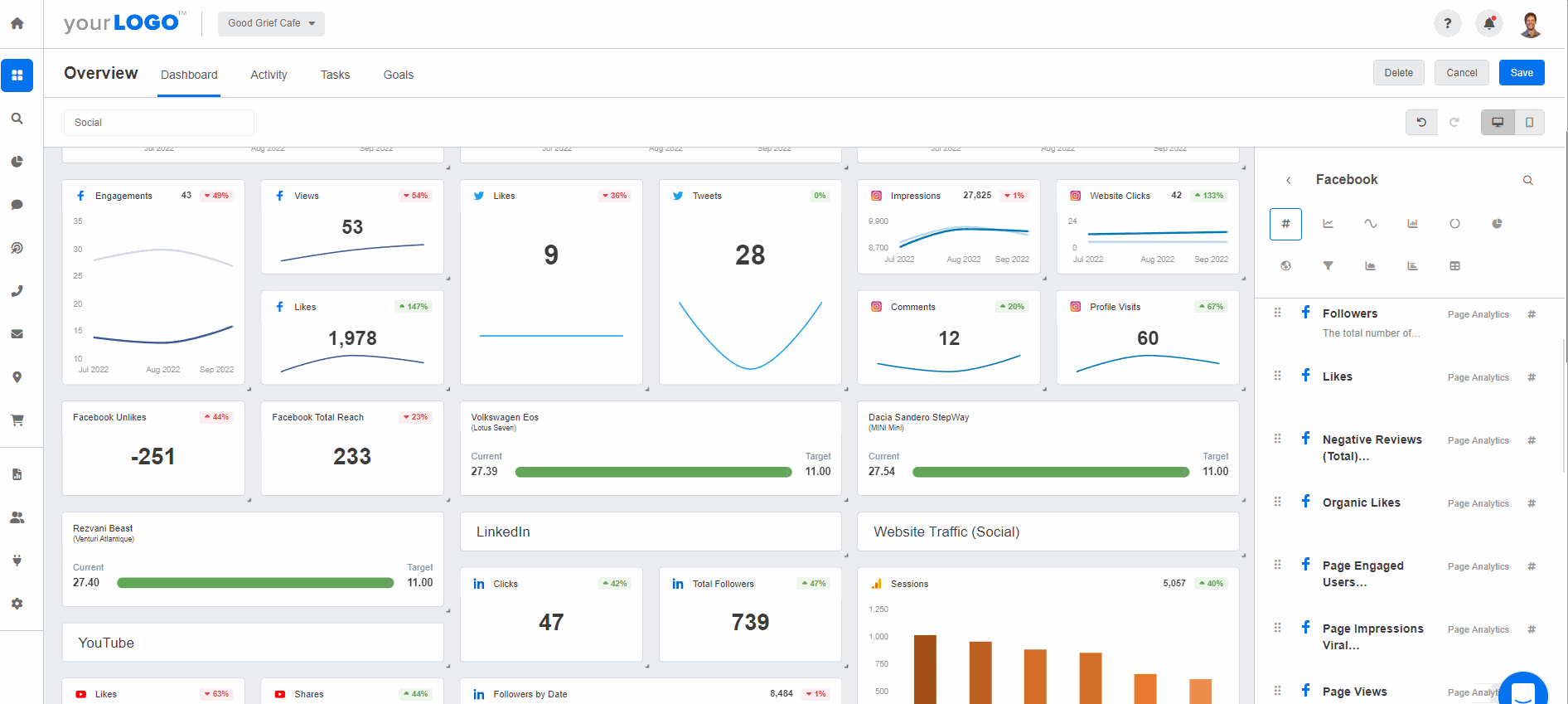
Create a custom dashboard with social media metrics, website insights, and other relevant data. Take your real estate marketing plan to the next level–try AgencyAnalytics today, free for 14 days.
6. Work on Personal Branding
Here’s the thing about the real estate industry. It’s all about building relationships–even more so than other industries.
Think about it. When a prospective buyer or seller signs up for real estate services, they’re partnering with their realtor. Not their social media account or website… the actual human being.
Personal branding creates that je ne sais quoi without trying too hard. Whether it's a bubbly personality or assertive tone of voice, it’s a way to capitalize on the unique strengths of each real estate professional. Personal branding comes in handy to:
Build Trust With Potential Clients. A personable and professional image helps foster confidence in the person’s abilities.
Put a Face to the Real Estate Business. When executed well, it creates an emotional connection, shows some personality, and demonstrates authenticity.
Foster Loyalty. A respected personal brand encourages previous clients to remain engaged and even advocate for the business.
Sure, it may feel intimidating to speak on camera or share real estate headshots on social media. However, it pays off in the long run and creates a trustworthy image.
Perfection isn’t necessary. Demonstrating an understanding of a potential client’s plight, or even sharing personal mistakes previously made (e.g., when buying your first property years ago) is a way to show your humanness and create a foundation for solid business relationships.
If you’re not quite sure where to start, here are some things to consider when refining personal brand.
Consideration | Description | Example |
|---|---|---|
Unique Selling Proposition (USP) | Determine what sets a realtor apart from other real estate agents. | "The Waterfront Specialist": A realtor specializing in properties near lakes, rivers, and oceans. |
Personal Values and Mission | Define personal values and infuse them into marketing efforts. | A real estate agent emphasizes their commitment to honesty and making the home-buying process less stressful. |
Voice and Tone | Decide on the tone of communications (e.g., upbeat, authoritative). | A realtor makes conversational TikTok videos that make viewers feel entertained and curious. |
Content Strategy | Create valuable content that aligns with the ideal client profile (ICP) and incorporates your unique touch. | A real estate agent creates a YouTube channel to share home-selling tips. They start videos with a quirky real estate fact to create a memorable personal brand. |
7. Take Things up a Notch With Virtual Reality (VR)
Sometimes, pictures or even the most compelling videos aren’t enough. It doesn’t quite capture the space, layout, or feel of the place.
Luckily, there’s experiential marketing! It’s a dynamic way to offer 360-degree property tours and give potential clients an immersive experience.
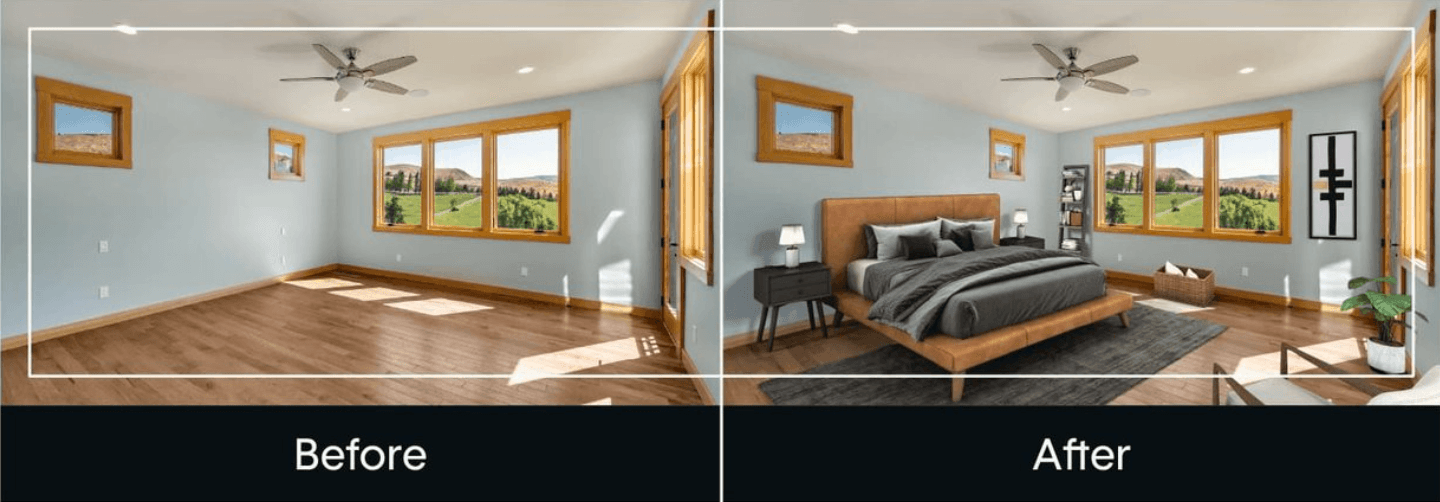
While virtual tours don’t substitute in-person viewing, they’re convenient and accessible from anywhere.
This is ideal for potential buyers who are out of town, internationally based, or unable to physically visit (for whatever reason). It also provides a way to view multiple properties at once, helping prospective buyers narrow their options in advance.
VR is also ideal for marketing properties that are unfinished or in the pre-construction phase. It’s a nifty way to visualize the end product, toggle with virtual finishings, and capture attention effectively.
To get the most from this online marketing tactic, here are a few neat ideas:
Include clickable hotspots for additional information about features, materials, or appliances.
Develop VR experiences that showcase the neighborhood, parks, schools, shopping areas, and local amenities.
Create simulations to show potential renovations for fixer-uppers.
Incorporate drone footage to provide aerial views of the surroundings.
How to Track the Results of Your Real Estate Marketing Efforts
Executing real estate marketing ideas is one part of the puzzle–success boils down to analytics. After all, you don’t want to spend countless hours on marketing efforts that don’t move the needle.
If you work at a real estate brokerage, you’re responsible for managing multiple properties. With so many moving parts in conjunction–like social media campaigns, lead gen activities, and advertising–you’ll need a way to understand the bigger picture.
The right data-tracking process is also important if you’re a marketing agency with real estate clients. Perhaps you’re specializing in this niche or managing projects across various industries. Either way, it’s a lot to manage all at once.
No need to toggle between platforms–use AgencyAnalytics as your central data hub. This tool automates the entire reporting process and consolidates data, leaving you with more time to execute real estate marketing ideas.
AgencyAnalytics helps us assess performance and empowers clients to stay updated on their campaigns. The ability to schedule monthly reports has been particularly beneficial, saving us billable time. This platform also eliminates the hassle of logging into multiple platforms and navigating complex interfaces.
Alexa Rees, SEO Manager, seoplus+
It’s simple and user-friendly, too! To get started:
1. Add Your Client. Sign in to your AgencyAnalytics account, head to “Client” in the top right corner, and click “Create.”
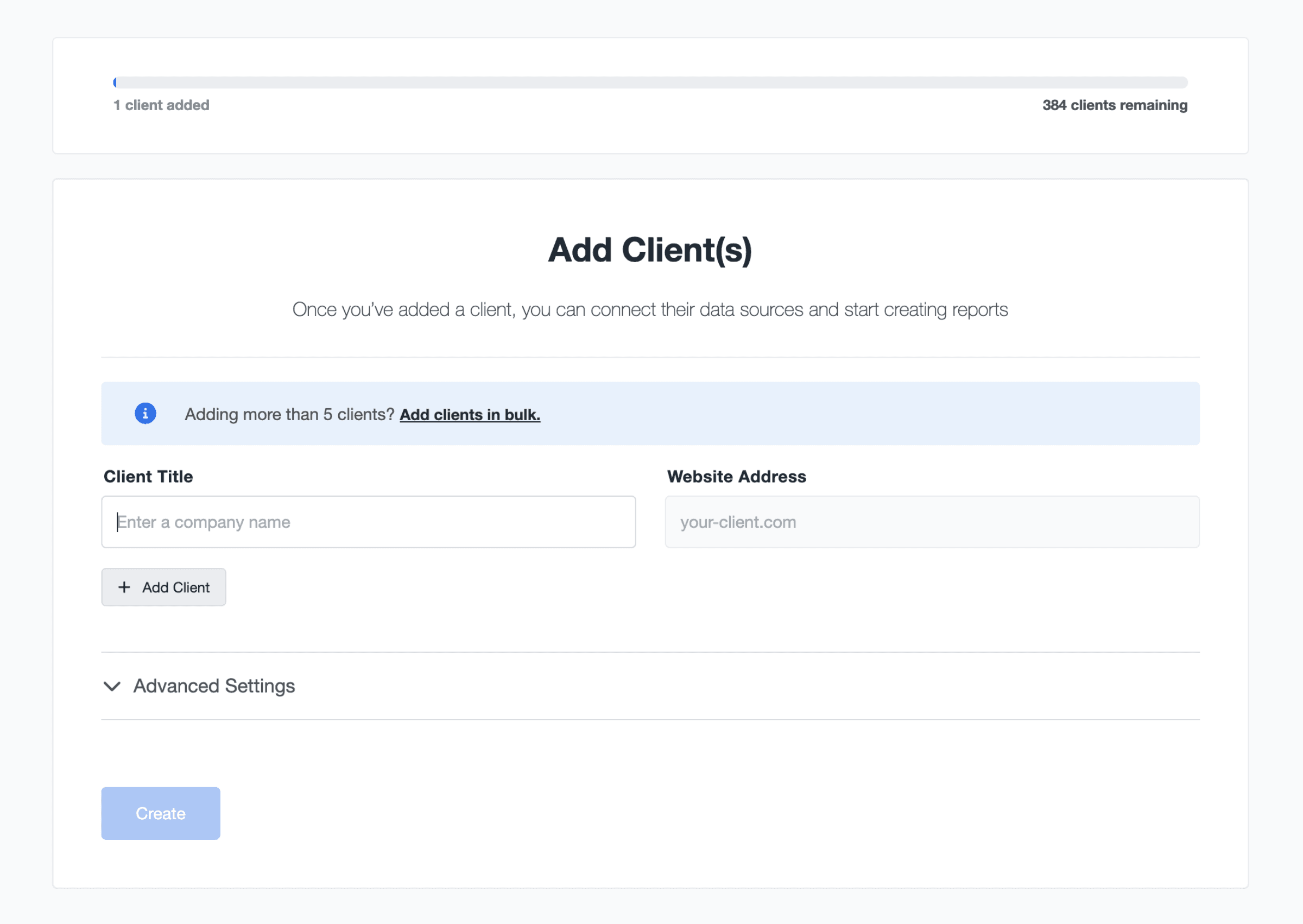
If you’re a real estate brokerage, it’s a good idea to start with an individual property. For example, say your client is a developer selling multiple units in a condo building called “Oceania.” They’re running PPC ads and campaigns across various social media channels.
Start by creating a client with this name. This makes it easier to house marketing data for this property in one place (pun intended).
Similarly, say you’re a marketing agency with a real estate client (e.g., a firm called “Prestige Properties”). Use this name to streamline their efforts into an easily searchable place.
2. Connect Your Client’s Marketing Integrations. On the left-hand menu, click “Integrations” and follow the instructions to link your chosen marketing platform(s). There are 80+ integrations to pick from, including:
…and much more!
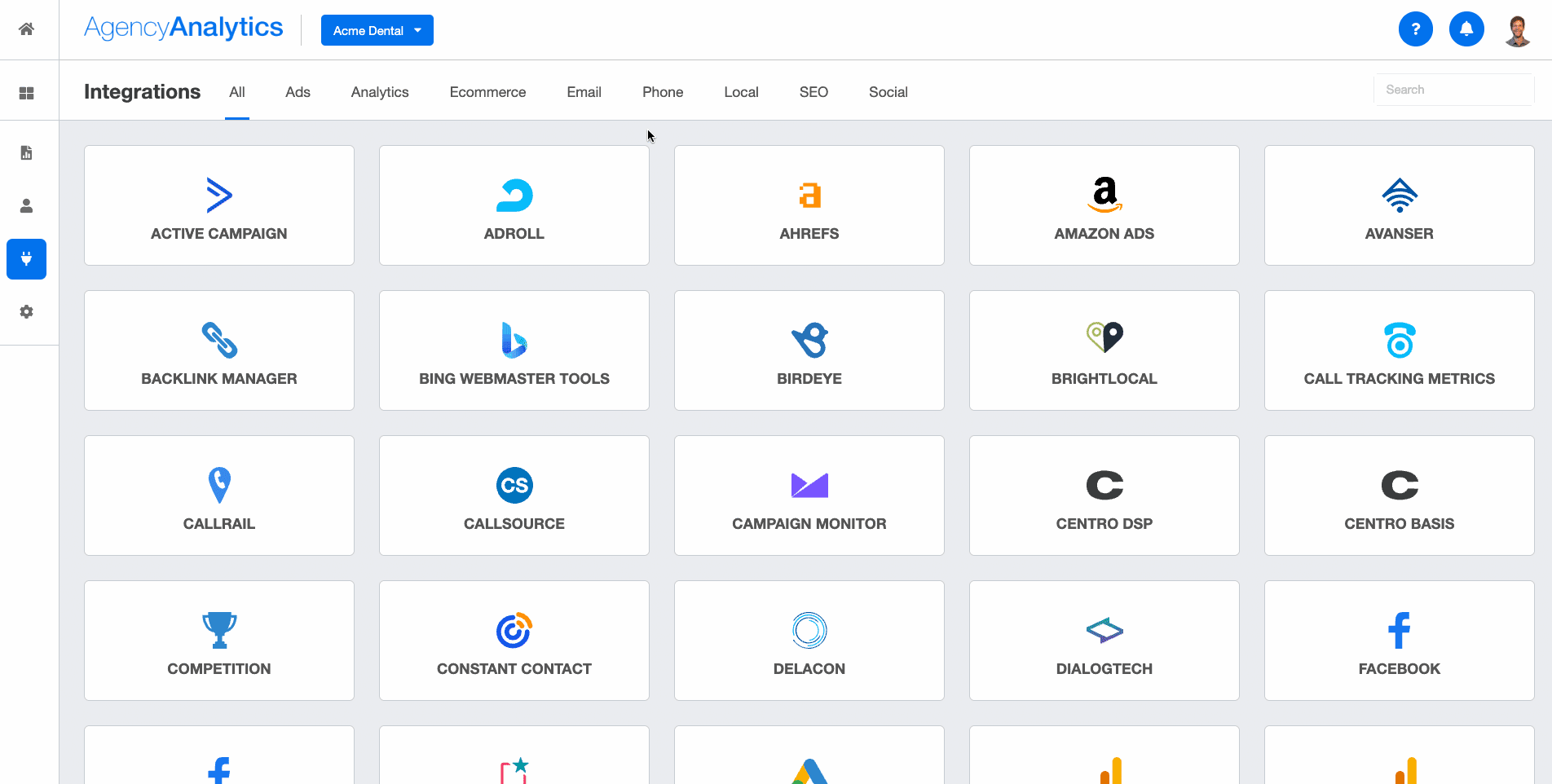
3. Create a Custom Dashboard or Choose a Template. Now it’s time for the fun stuff–creating a real-time dashboard.
To get started, click on the client you just added, followed by “Create Dashboard Section.” Then, you’ll have the options to:
Build a custom dashboard from scratch.
Go with a “Smart Section” dashboard, which auto-populates with your client’s unique metrics in less than 11 seconds.
Duplicate a section from an existing dashboard.
Choose a pre-built dashboard template, including:
Whichever dashboard you choose, it’s easy to customize as needed. Add widgets, toggle with data visualizations, or include annotations for extra context.
Here’s another bonus: Easily flip any dashboard into a report in a few seconds. Create a downloadable PDF, generate a shareable link, or schedule an email. Even create an 11-second Smart Report that populates with your client’s unique metrics! It’s all up to you.
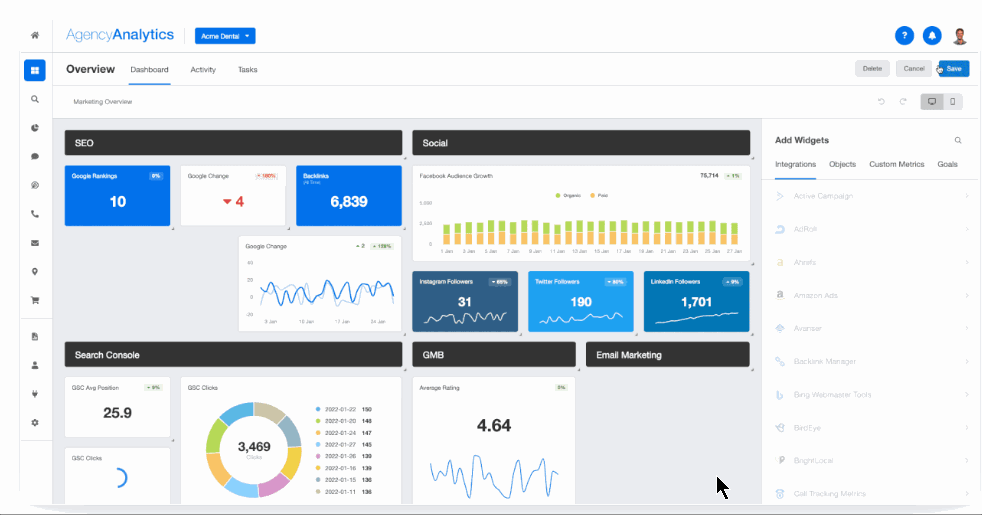
Invest in a Powerful Tool That Centralizes Real Estate Metrics and More
As we’ve covered, there’s no shortage of real estate marketing ideas. The trick is to understand the needs of prospective clients, create compelling messaging, and use a variety of content types to capture attention.
Whatever you choose to create, have a system in place to monitor the results. It’s the only way to create an effective real estate marketing plan and drive results.
No need to rely on manual reporting methods or switch between platforms. Use AgencyAnalytics to:
Automate data retrieval across 80+ platforms, which results in greater efficiency and accuracy.
Evaluate the success of various campaigns in real-time, including social media efforts, PPC ads, and email marketing.
Seamlessly integrate with your CRM, streamline lead generation, and help drive real estate sales.
Create white-labeled dashboards and reports for that professional, branded finish.
Whether you’re managing new properties or adding new clients to the roster, AgencyAnalytics is just what you need to sustain business growth. Invest in a system that makes life easier–both for you and your clients.

Monitor real estate leads, social media activity, and website traction–all in one place. Gain access to 80+ and a range of reporting features–explore AgencyAnalytics today, free for 14 days.
Impress clients and save hours with custom, automated reporting.
Join 7,000+ agencies that create reports in under 30 minutes per client using AgencyAnalytics. Get started for free. No credit card required.
Already have an account?
Log in
Written by
Faryal Khan is a multidisciplinary creative with 10+ years of experience in marketing and communications. Drawing on her background in statistics and psychology, she fuses storytelling with data to craft narratives that both inform and inspire.
Read more posts by Faryal KhanSee how 7,000+ marketing agencies help clients win
Free 14-day trial. No credit card required.



